Simmondsia Chinensis Seed Oil for Acne: Benefits and Usage Guidelines
As we inspect the potential benefits of natural oils for skin health, Simmondsia chinensis, commonly known as jojoba, emerges with promising attributes, particularly in acne management. Originating from the seed of the jojoba plant, jojoba oil has been identified for its similarity to human sebum, which may play a role in its effectiveness in skin care. The physical and chemical characteristics of jojoba seed oil contribute to its stability and shelf life, making it a valuable ingredient in cosmetic formulations.
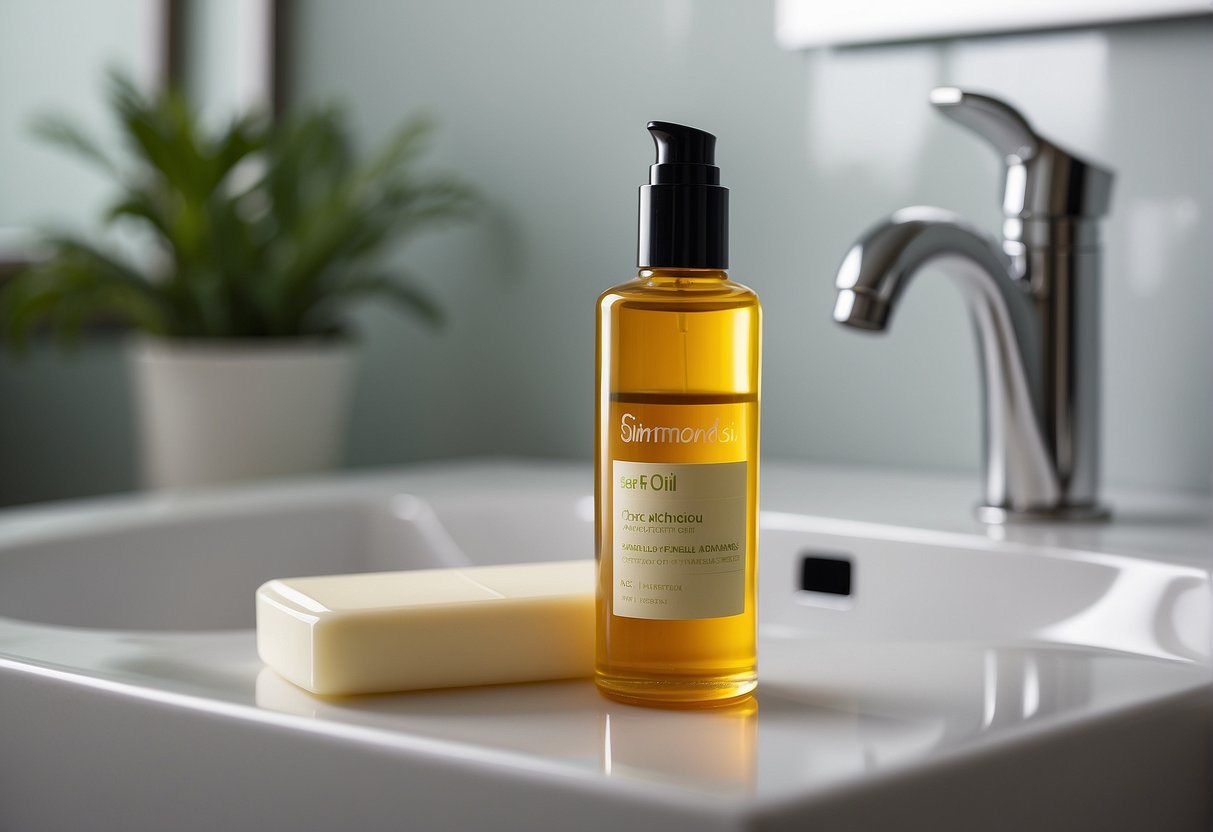
Research indicates that jojoba oil may offer a range of skin benefits, due to its potential anti-inflammatory properties, which are significant when dealing with acne-prone skin. The presence of antioxidants in the oil could also enhance its profile as a skin-friendly product. When applied to skin with acne, the soothing effects of jojoba oil may help to calm inflammation and reduce the presence of skin lesions.
In the context of holistic health, the utilization of jojoba oil expands beyond acne treatment to encompass a broader significance in skin care regimens. Jojoba oil's versatility allows it to be incorporated into various products, addressing different skin needs and confirming its place as a cherished component in both traditional and modern cosmetic industries.
Key Takeaways
- Jojoba oil is derived from Simmondsia chinensis seeds and mimics human sebum.
- It has potential anti-inflammatory properties making it beneficial for acne management.
- Jojoba oil is stable and versatile, fitting into diverse cosmetic applications.
Chemical Composition and Physical Properties
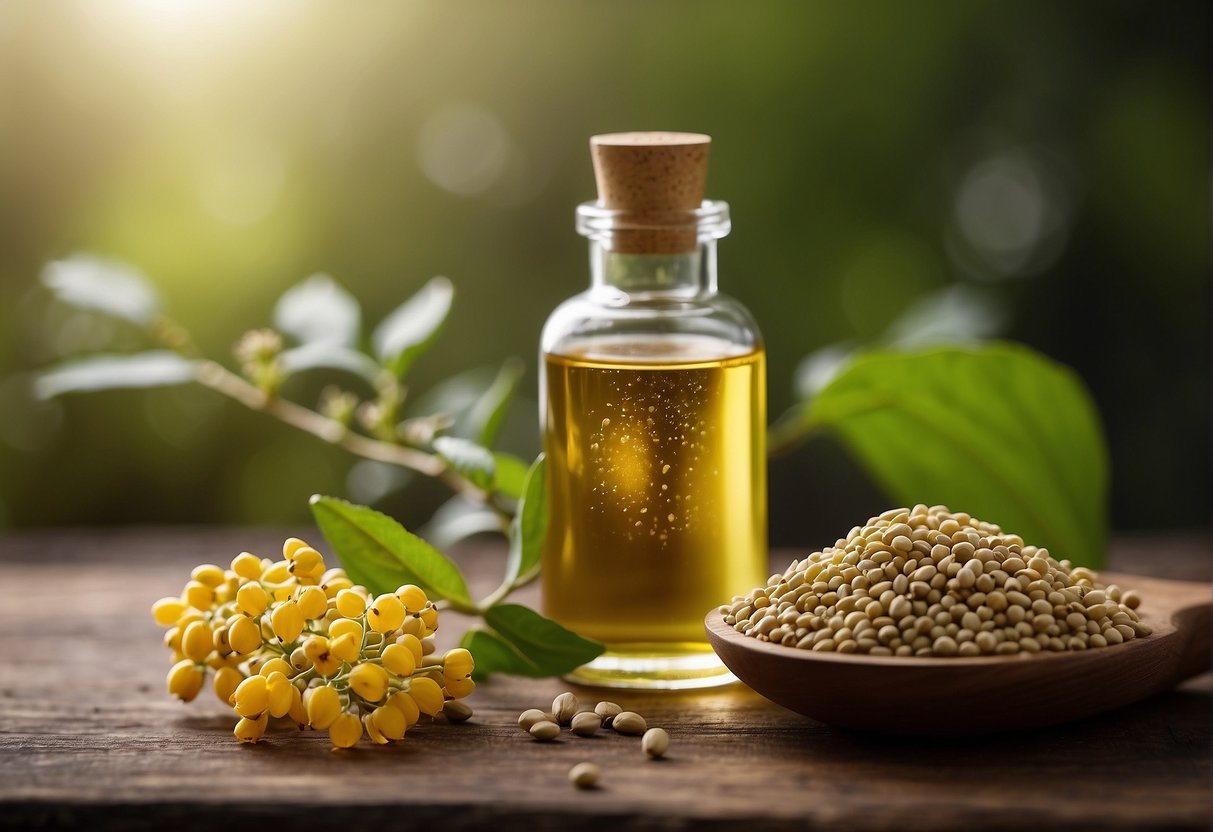
We explore the unique chemical makeup and physical characteristics of Jojoba oil that contribute to its applications, focusing on its role in skincare, particularly against acne.
Understanding Jojoba Oil
Jojoba oil is derived from the seeds of Simmondsia chinensis and is primarily composed of liquid wax esters. This kind of oil is structurally and chemically very similar to human sebum, which is the natural oil produced by our skin. Unlike typical triglycerides found in most seed oils, Jojoba oil consists mainly of long-chain fatty acids and fatty alcohols, giving it a remarkably stable molecular configuration.
Its chemical composition varies slightly among different extractions but includes eicosenoic acid, erucic acid, and oleic acid, amongst others. Jojoba oil remains in a liquid state due to its high eicosenoic acid content and has a notable resistance to high temperatures and oxidization, thanks to its unique structure.
Benefits of Wax Esters
The wax esters in Jojoba oil are central to its benefits for acne-prone skin. They help to fortify the skin's barrier and have a natural affinity with the lipid layer of the skin. The esters' long-chain alcohols and acids closely resemble those in the human sebaceous secretion, allowing the oil to integrate seamlessly into the skin without clogging pores.
This integration aids in regulating sebum production, minimizing the occurrence of acne. Additionally, the antibacterial properties of the wax esters contribute to a reduction in microbial growth which is often a contributing factor to acne outbreaks, making Jojoba oil an effective ingredient within acne-treatment formulations.
Skin Benefits and Acne Management
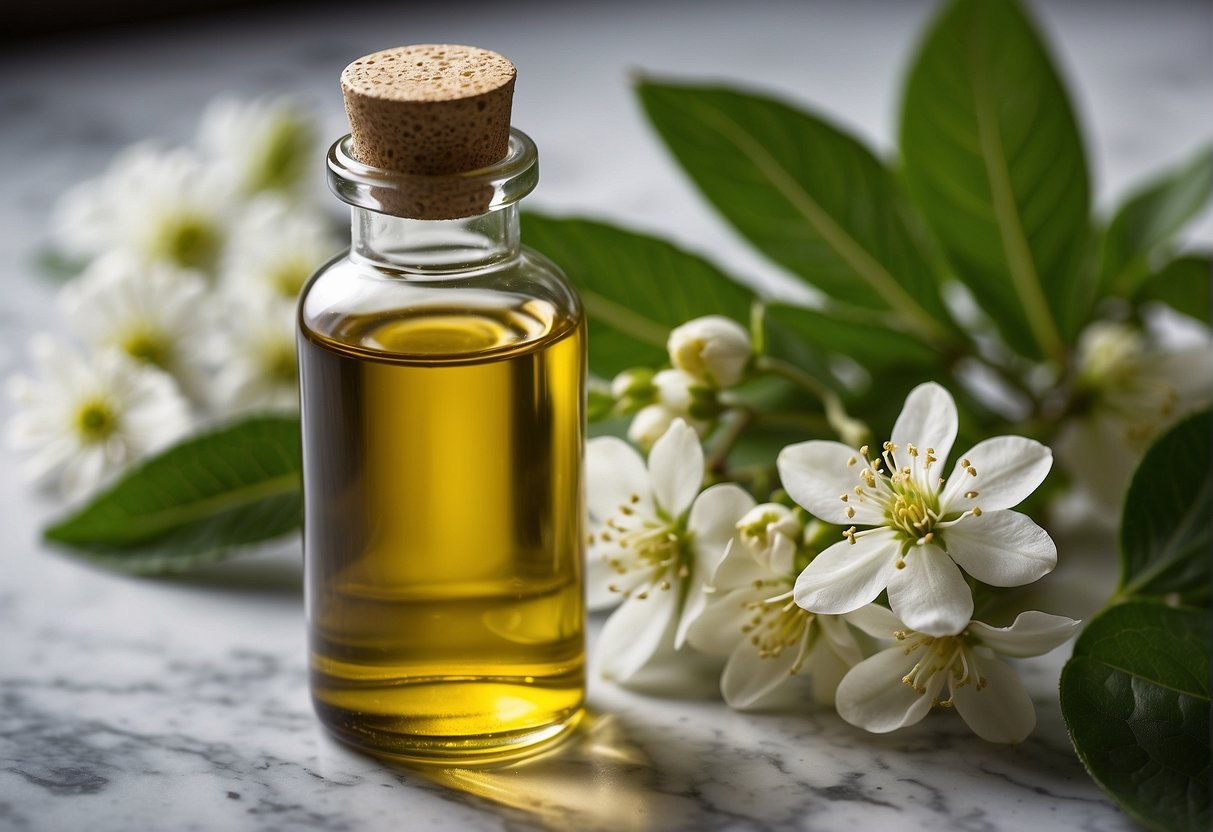
Within this section, we're exploring the virtues of Simmondsia Chinensis (Jojoba) seed oil in skincare, specifically focusing on its compatibility with acne-prone skin, anti-inflammatory and healing capabilities, and its ability to moisturize without clogging pores.
Acne-Prone Skin Care
Jojoba seed oil is non-comedogenic, meaning it doesn't clog pores, a crucial aspect when formulating skincare products for acne-prone skin. It's also believed to mimic the skin's natural oils, which may help regulate oil production and prevent acne.
Anti-Inflammatory and Healing Properties
The anti-inflammatory properties of jojoba oil can soothe irritated skin, reduce redness and accelerate the healing process of acne lesions. Its healing effects also extend to promoting skin repair without leaving an oily residue.
Moisturizing Without Clogging Pores
Jojoba oil is a surprisingly effective moisturizer for acne-prone skin as it provides necessary hydration without contributing to further breakouts. It penetrates deeply into the skin, offering moisture without sealing off the skin's surface, which is essential for maintaining clear skin.
Jojoba Oil in Skin Care Products
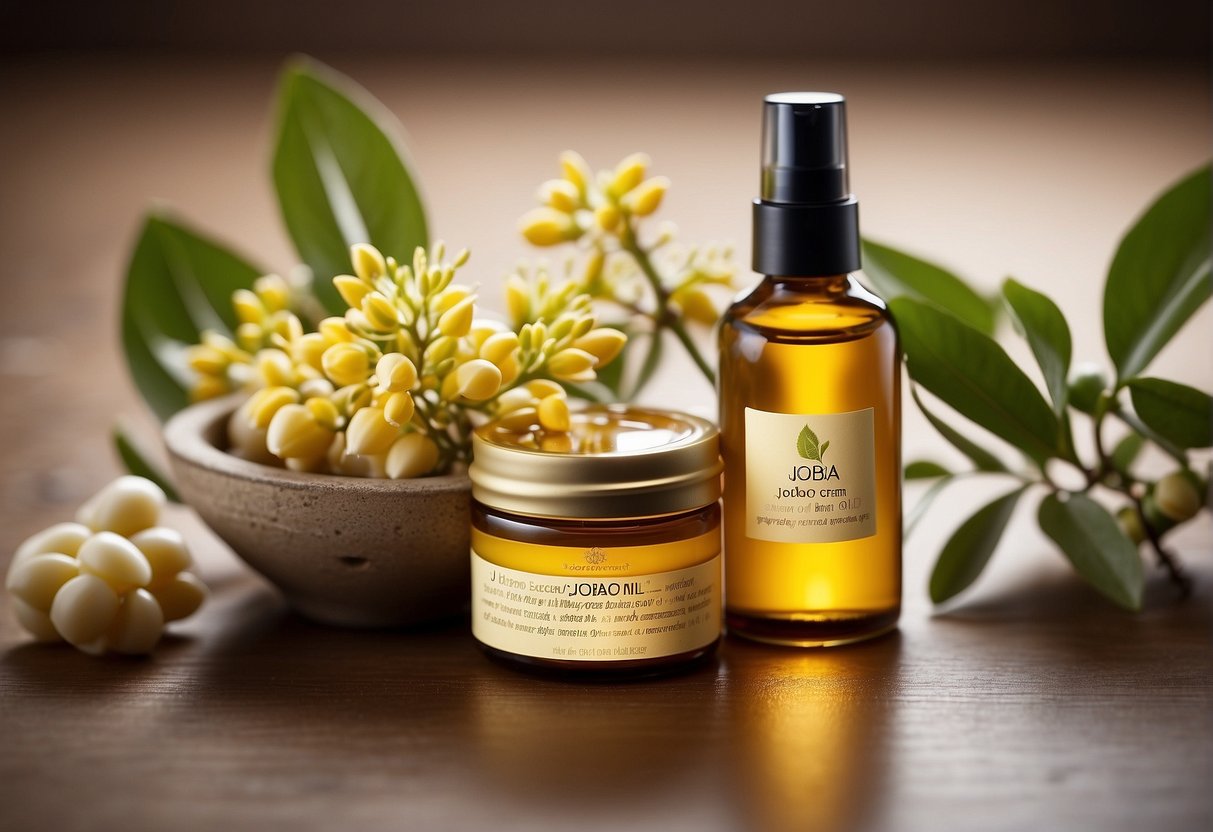
Jojoba oil, derived from the seeds of Simmondsia chinensis, is incorporated into a multitude of skin care products, ranging from moisturizers to targeted treatment solutions. Its compatibility with various skin types and conditions makes it a versatile ingredient in daily skin care routines.
Daily Moisturizers and Cleansers
We find that jojoba oil is a staple in many daily moisturizers and cleansers. It is highly regarded for its hydrating properties, due to its similarity to the natural oils produced by human skin, known as sebum.
- Moisturizers: Jojoba oil is used to enhance the skin's natural barrier, trapping moisture to prevent dryness.
- Cleansers: It's effective in removing dirt and makeup without stripping the skin's natural oils, maintaining a balanced complexion.
Specialized Treatment Products
Our analysis shows that jojoba oil is not just a moisturizing agent; it also plays a critical role in specialized skin treatment products.
- Acne Treatment: Jojoba oil is found in serums and spot treatments for acne, helping to manage oil levels and reduce inflammation.
- Healing Masks: Formulations with jojoba oil are used in facial masks to promote skin healing and combat blemishes.
Safe Usage and Considerations
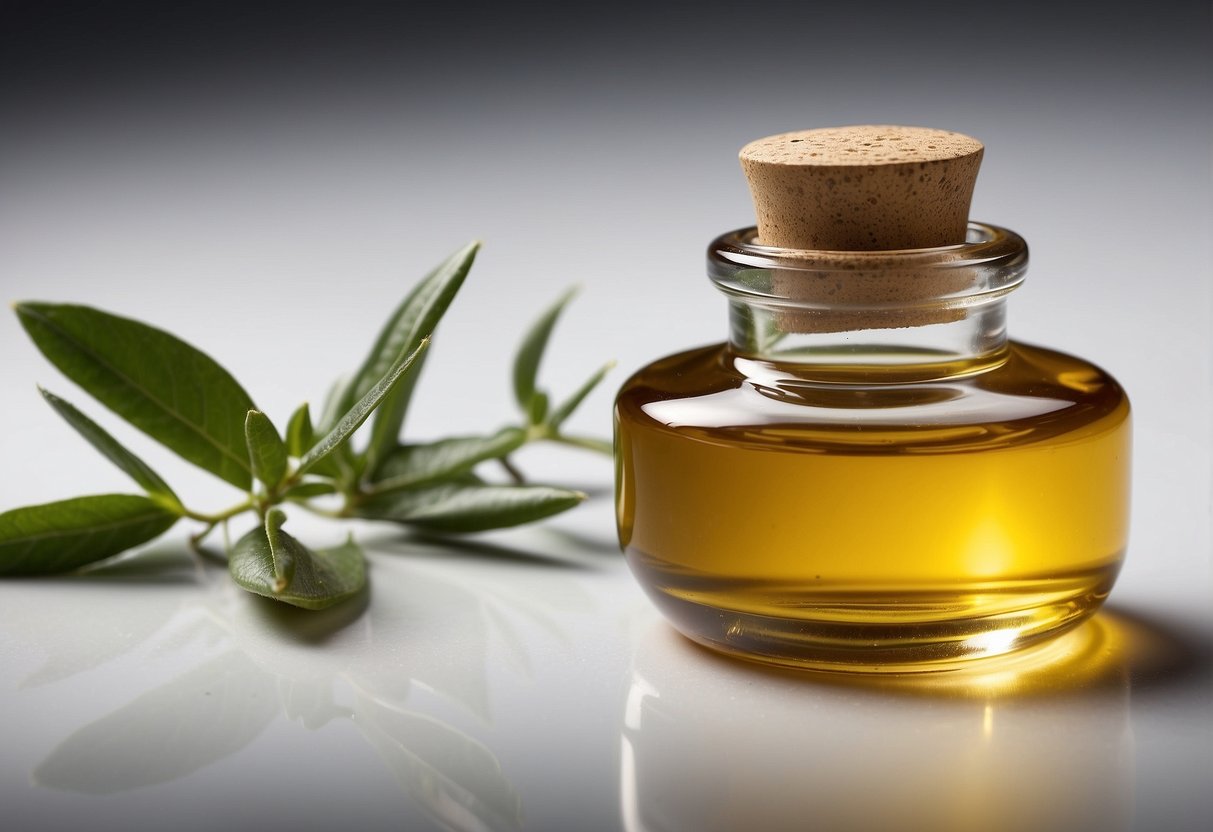
When incorporating Simmondsia chinensis (jojoba) seed oil into acne treatment routines, it's paramount to ensure it's applied safely and effectively. Below, we detail essential practices to maximize benefits while minimizing potential adverse effects.
Patch Testing and Allergies
Before integrating jojoba seed oil into your acne regimen, we recommend performing a patch test to rule out any allergic reactions. Apply a small amount of the oil to a discreet area of your skin and wait 24 to 48 hours. Monitor the site for any signs of redness, irritation, or itching. Although jojoba oil is generally known to be hypoallergenic, individual sensitivities can still occur.
Appropriate Concentrations and Combinations
Jojoba oil can be used on its own or as a carrier oil for essential oils that are beneficial for acne-prone skin. Ensure the concentration of essential oils does not exceed recommendatory dilution ratios to avoid adverse effects such as irritation or sensitization. For example:
- Tea Tree Oil: 2-5% dilution (2-5 drops per 100 drops of carrier oil)
- Lavender Oil: 1-4% dilution (1-4 drops per 100 drops of carrier oil)
Adhering to appropriate concentrations enhances the safe use of jojoba oil and maintains skin integrity.
Holistic Approaches to Skin Health
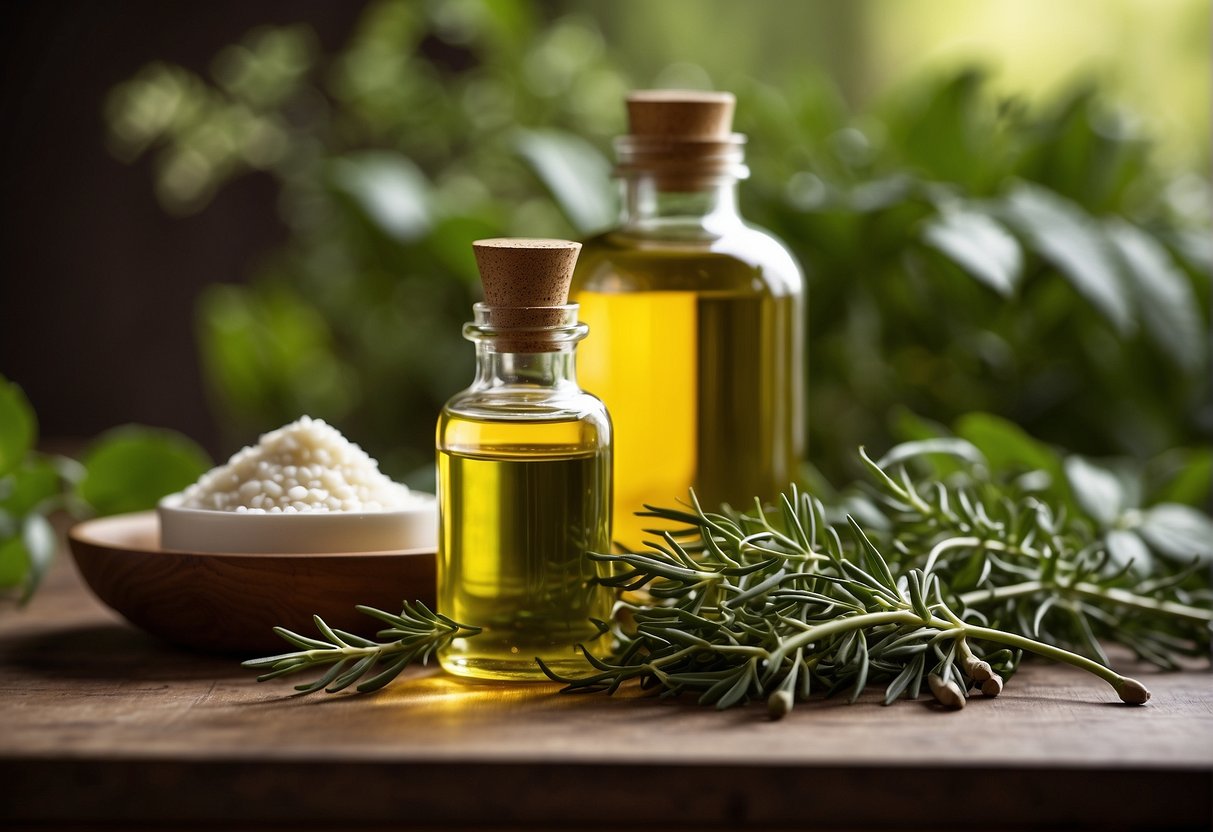
We'll explore the role of Simmondsia Chinensis (jojoba) seed oil in supporting and enhancing skin health, focusing on its ability to moisturize and balance oil production.
Incorporating Jojoba Oil into Routines
Jojoba oil is a natural substance we find highly compatible with our skin's own sebum. When we incorporate it into our skincare routines, it helps to balance oil production, which can mitigate common skin concerns such as acne. Our routine can include applying a few drops of jojoba oil post-cleansing or mixing it with our daily moisturizer.
We recognize jojoba oil for its moisturizing properties, making it a substantial component in our everyday skin care. By consistently using jojoba oil, we can help our skin remain hydrated and supple, helping to prevent the dryness that can exacerbate skin irritation and acne.
Supporting Skin’s Natural Functions
Jojoba oil is rich in vitamin E, a nourishing antioxidant, which helps us defend the skin against environmental stressors. This contributes to the overall resilience and health of our skin. With its antioxidants, we can support our skin's natural healing processes.
By maintaining the regular application of jojoba oil, we take a proactive step in supporting our skin's barrier function, helping to ensure that moisture is locked in and irritants are kept out. It's in our favor to embrace the holistic properties of jojoba oil to contribute to a comprehensive approach to skin health.
Historical and Cultural Significance
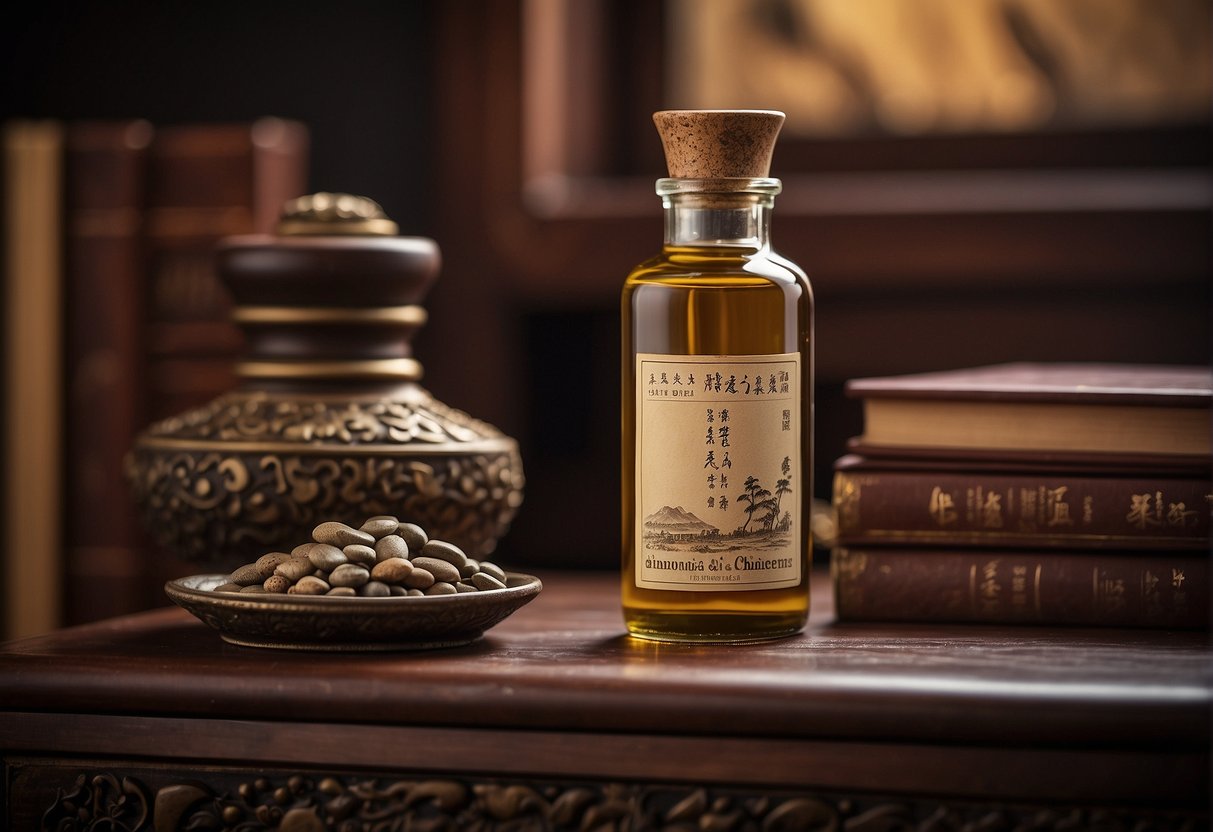
Traditionally, Simmondsia chinensis, commonly known as jojoba, has deep-rooted importance in natural remedies harnessed by indigenous peoples. In modern practices, its oil has gained recognition for its beneficial properties in skin care including the treatment of acne.
Traditional Uses by Indigenous Peoples
In regions such as Southern Arizona, Southern California, and Northwestern Mexico, Native Americans have a long-standing history of employing jojoba oil in their folk medicine. Recognized for its healing properties, the oil was traditionally used to treat skin conditions and wounds. Specifically, its use in remedy preparations for sores, burns and as a skin moisturizer attests to its versatility in traditional applications.
Jojoba Oil in Modern Practices
Today, jojoba oil is esteemed within the cosmetic industry, especially for its role in acne management. Its unique composition, closely resembling human sebum, allows it to integrate seamlessly into skin care routines promoting skin health. The non-comedogenic nature of jojoba oil makes it a popular choice in formulations aimed at moisturizing skin without exacerbating acne.
Frequently Asked Questions
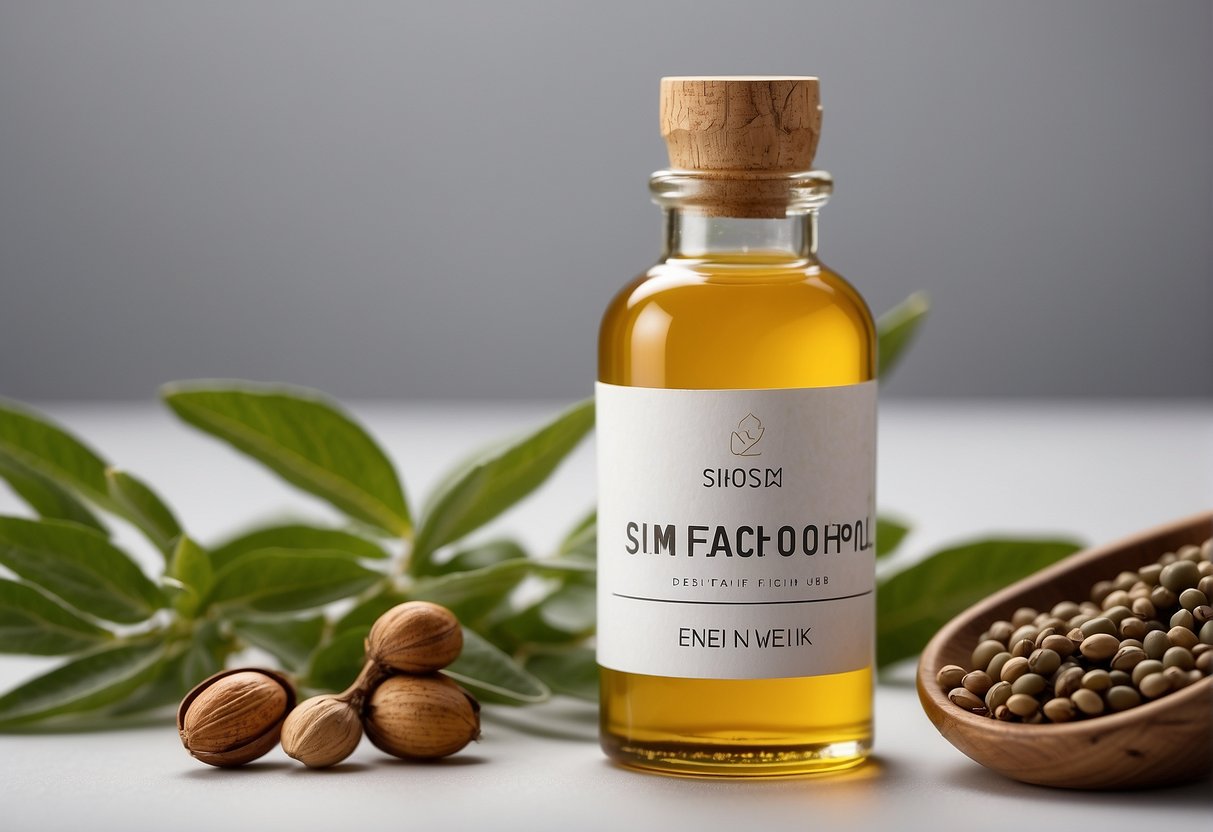
In this section, we address common queries regarding the use of Simmondsia Chinensis (Jojoba) seed oil for acne treatment and skin care.
Can jojoba oil improve the condition of acne-prone skin?
Jojoba oil is known for its similarity to human sebum, which allows it to potentially balance oil production in acne-prone skin. Its anti-inflammatory properties may also reduce redness and swelling associated with acne.
Are there any side effects associated with using jojoba oil on the skin?
Most users find jojoba oil gentle and well-tolerated, but as with any topical treatment, allergic reactions or irritation can occur. It's recommended to perform a patch test before using jojoba oil extensively.
How does jojoba oil affect acne scars and can it help reduce their appearance?
Jojoba oil is said to promote skin healing, which can help reduce the appearance of acne scars over time. Its rich content of vitamin E is particularly helpful in repairing skin.
Is there a chance of jojoba oil clogging pores and exacerbating acne?
Jojoba oil is non-comedogenic and unlikely to clog pores, a characteristic that makes it suitable for use on acne-prone skin. We suggest selecting high-quality, pure jojoba oil to minimize any risks of pore-clogging impurities.
What do user reviews suggest about the effectiveness of jojoba oil for treating acne?
User reviews generally indicate success with jojoba oil in managing acne, citing improvements in skin clarity and inflammation reduction. However, efficacy can vary with skin types and individual conditions.
How do jojoba oil and other oils compare for the treatment of acne?
Compared to other oils, jojoba oil is unique in its structural similarity to human sebum, potentially making it more effective in regulating skin's oiliness and less likely to aggravate acne. It typically stands out for its gentle, balancing action on the skin.